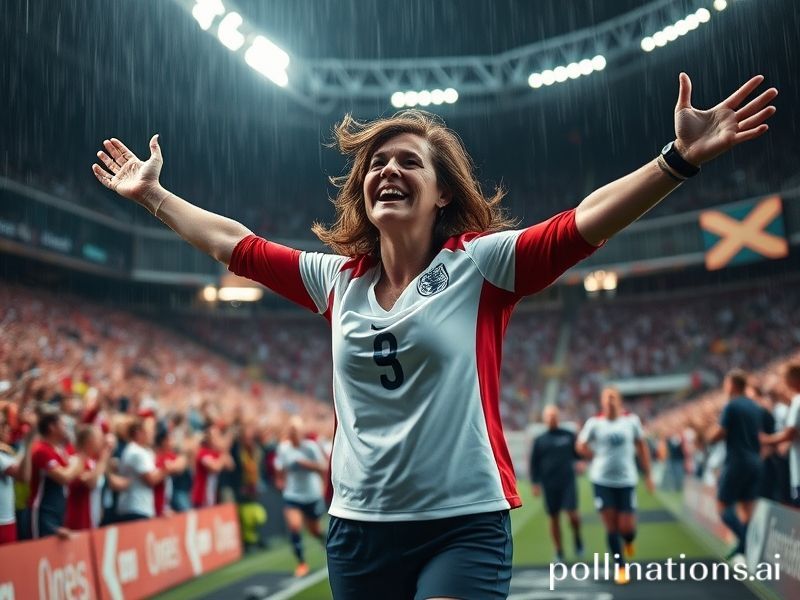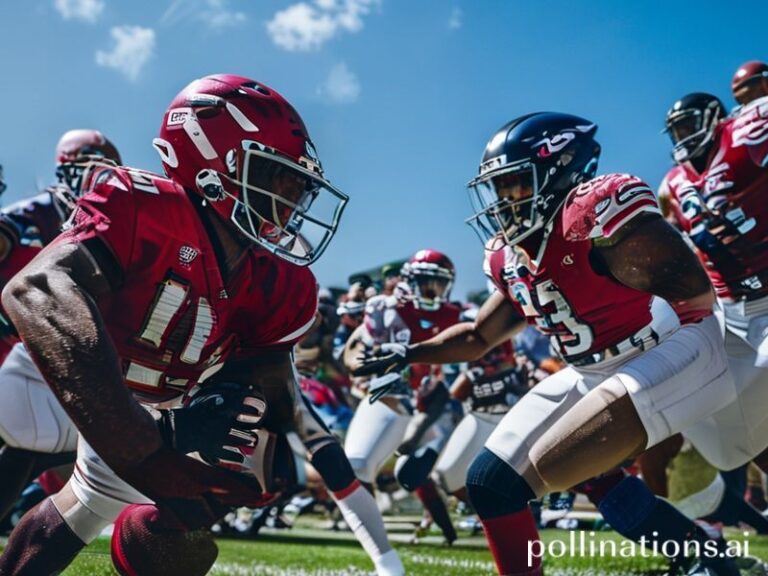Sarina Wiegman: The Dutch Tactician Quietly Fixing a Fractured World, One Trophy at a Time
Sarina Wiegman: The Dutch Architect Who Rebuilt English Football While the World Burned
By Dave’s International Desk, somewhere over the North Sea
If you’ve spent the last decade doom-scrolling through cascading crises—climate tipping points, crypto scams, populist re-runs—it’s oddly reassuring to know that somewhere, a 54-year-old Dutch woman in sensible sneakers is still putting cones down and making grown millionaires run until they cry. Sarina Wiegman, head coach of the England women’s team, has become the planet’s most unlikely geopolitical stabilizer: she wins things, and for 90 minutes plus stoppage time the rest of us get to forget that the ice caps are auditioning for Atlantis.
Born in The Hague during the Cold War—back when “mutually assured destruction” sounded like a FIFA fair-play seminar—Wiegman spent her early career as a tenacious midfielder who could thread a pass through a brick wall or, if required, use the brick wall to illustrate Dutch tactical theory. When FIFA finally remembered women were allowed to play past puberty, she graduated to management like a chess hustler who realizes the board is bigger on the sidelines.
Her first act of international mischief was turning the Netherlands into European champions in 2017, a feat roughly as improbable as discovering tulips that bite. Orange-clad fans who once measured success by how many bicycles they could fit into a canal suddenly had a parade route and a trophy. The Dutch FA, caught between elation and fiscal panic, asked if she could perhaps repeat the trick with England, a nation that had turned losing semis into a national hobby.
To say Wiegman inherited a squad “brimming with potential” is sports-page code for “they could bottle it on any continent.” England had managed to snatch hope-snatching from the jaws of hope itself. Enter Sarina, armed with a clipboard, a polyglot’s shrug, and the expression of someone who has already seen whatever apocalypse you’re promising next Tuesday. Two years later, the Lionesses roared to a Euros victory at a packed Wembley, proving that 87,000 Brits can indeed sing “It’s Coming Home” in tune if you give them an actual reason.
The global implications were delightfully disproportionate. Viewing figures from Lagos to Lagos-on-Thames spiked, sponsors discovered women’s football wasn’t just a CSR footnote, and FIFA’s accountants suddenly learned new adjectives like “scalable.” Overnight, federations from Bogotá to Brisbane began asking whether their own underfunded programs might benefit from a Dutchwoman who communicates largely through raised eyebrows and devastating diagonal balls.
But Wiegman’s masterstroke is subtler than silverware. In a political climate where borders harden faster than uncooked ramen, she fields starting XIs that read like UN roll-calls minus the vetoes: Colombian-born, Canadian-raised striker; Jamaican-heritage winger; Scottish-Spanish hybrid at the back. When they win, the tabloids hail “English grit,” blissfully unaware that grit, like most things these days, is imported and significantly improved by EU standards.
Meanwhile, her pay—reportedly one-fifth of Gareth Southgate’s—reminds us that the gender pay gap is alive, kicking, and inexplicably missing sitters from six yards. The FA calls it “market forces”; everyone else calls it Tuesday.
Yet cynics take note: Wiegman does not traffic in moral fairy tales. Ask her about “changing the world” and she’ll pivot to pressing triggers faster than a diplomat dodging a subpoena. She wins because she out-plans, out-runs, and occasionally out-glares opponents until they confess positional sins. The larger victory is that millions of girls now see football as a career rather than a phase between netball and nursing—an outcome certain patriarchs find more terrifying than VAR.
So as COP delegates argue over carbon credits like divorced billionaires splitting the art, and tech bros pivot from metaverses to AI girlfriends, Sarina Wiegman keeps drawing rectangles on whiteboards and making order out of entropy. If civilization does collapse, archaeologists will find her tactics board perfectly preserved in a peat bog, still demanding a high line and better cover shadows. Until then, she offers a rare commodity: proof that competence is not yet extinct, and that sometimes—just sometimes—the good guys, gals, and non-binary press-resistant midfielders actually win.







